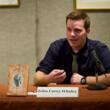Me and Earl and the Dying Girl: A Novel
(Libby/OverDrive eBook, Kindle)
Available Platforms
Description
More Details
Similar Titles From NoveList
Similar Authors From NoveList
Published Reviews
Booklist Review
*Starred Review* Greg Gaines, 17, would be the first to tell you that his constant dickhead behavior makes him the least likely person to befriend a classmate dying of leukemia. But he is pushed into it by his mother and, well, the result is this horrifyingly inane, unstoppable barf-fest of a book. Greg prefers to keep a low profile at school, instead collaborating with his almost-gangsta pal, Earl, on terrible remakes of classic films: Apocalypse Later with Super Soakers, The Manchurian Cat-idate with cats. But his knack for cracking jokes keeps the dying girl, Rachel, smiling, and pretty soon the whole school thinks he is some kind of hero. He is even pushed into making a final opus: Rachel the Film, aka the worst film ever made. One need only look at the chapter titles ( Let's Just Get This Embarrassing Chapter Out of the Way ) to know that this is one funny book, highlighted by screenplay excerpts and Earl's pissy wisdom. What's crazy is how moving it becomes in spite of itself. The characters are neither smart or precocious. Greg is not suitably moved by Rachel's struggle. His film sucks. He thinks bereavement means being attacked by beavers. But it's this honest lack of profundity, and the struggle to overcome it, that makes Andrews' debut actually kinda profound.--Kraus, Daniel Copyright 2010 Booklist
Publisher's Weekly Review
Senior Greg Gaines has drifted through high school trying to be friendly with everyone but is friends with no one, moving between cliques without committing. His only hobby is making awful movies with Earl, his foul-mouthed pal. Greg's carefully maintained routine is upset when his mother encourages him to spend time with Rachel, a classmate suffering from leukemia. Greg begrudgingly befriends Rachel, before being conned by another classmate into making a movie about her. The story employs a number narrative devices, including screenplay-style passages, bulleted lists, movie reviews, and fake newspaper headlines, which are expertly handled by a chorus of voice actors (Keith Szarabajka, Hillary Huber, Kirby Heyborne, Abigail Revasch, and Adenrele Ojo). The use of multiple voices textures the story and increases the entertainment value of the entire audiobook. Ages 14-up. An Abrams/Amulet paperback. (June) © Copyright PWxyz, LLC. All rights reserved.
School Library Journal Review
Gr 9 Up-This debut novel is told from the point of view of intensely self-critical Greg S. Gaines, an aspiring filmmaker. A self-described pasty-faced failure with girls, the 17-year-old spends most of his time with his friend Earl, a foul-mouthed kid from the wrong side of town, watching classic movies and attempting to create their own cinematic masterpieces. When Greg's mother learns that Rachel, one of his classmates, has been diagnosed with leukemia, she encourages him to rekindle the friendship that started and ended in Hebrew school. While Greg promises that his story will contain "zero Important Life Lessons," his involvement with Rachel as her condition worsens nonetheless has an impact. In a moment of profundity, however, Greg also argues, "things are in no way more meaningful because I got to know Rachel before she died. If anything, things are less meaningful." Andrews makes use of a variety of narrative techniques to relate the story: scenes are presented in screenplay format and facts are related as numbered and elaborated-upon lists that are tied together by a first-person narrative divided into chapters indicated with self-deprecating titles (e.g., "I put the 'Ass' in 'Casanova'"). While the literary conceit-that the protagonist could be placed in a traditionally meaningful situation and not grow-is irreverent and introduced with a lot of smart-alecky humor, the length of the novel (overly long) and overuse of technique end up detracting from rather than adding to the story.-Amy S. Pattee, Simmons College, Boston (c) Copyright 2012. Library Journals LLC, a wholly owned subsidiary of Media Source, Inc. No redistribution permitted.
Kirkus Book Review
why is he writing" this stupid book"?--Greg lets readers in on plenty else. His filmmaking ambitions. His unlikely friendship with the unfortunately short, chain-smoking, foulmouthed, African-American Earl of the title. And his unlikelier friendship with Rachel, the titular "dying girl." Punctuating his aggressively self-hating account with film scripts and digressions, he chronicles his senior year, in which his mother guilt-trips him into hanging out with Rachel, who has acute myelogenous leukemia. Almost professionally socially awkward, Greg navigates his unwanted relationship with Rachel by showing her the films he's made with Earl, an oeuvre begun in fifth grade with their remake of Aguirre, Wrath of God. Greg's uber-snarky narration is self-conscious in the extreme, resulting in lines like, "This entire paragraph is a moron." Debut novelist Andrews succeeds brilliantly in painting a portrait of a kid whose responses to emotional duress are entirely believable and sympathetic, however fiercely he professes his essential crappiness as a human being. Though this novel begs inevitable thematic comparisons to John Green's The Fault in Our Stars (2011), it stands on its own in inventiveness, humor and heart. (Fiction. 14 up)]] Copyright Kirkus Reviews, used with permission.
Booklist Reviews
*Starred Review* Greg Gaines, 17, would be the first to tell you that his constant "dickhead behavior" makes him the least likely person to befriend a classmate dying of leukemia. But he is pushed into it by his mother and, well, the result is this "horrifyingly inane," "unstoppable barf-fest" of a book. Greg prefers to keep a low profile at school, instead collaborating with his almost-gangsta pal, Earl, on terrible remakes of classic films: Apocalypse Later with Super Soakers, The Manchurian Cat-idate with cats. But his knack for cracking jokes keeps the dying girl, Rachel, smiling, and pretty soon the whole school thinks he is some kind of hero. He is even pushed into making a final opus: Rachel the Film, aka "the worst film ever made." One need only look at the chapter titles ("Let's Just Get This Embarrassing Chapter Out of the Way") to know that this is one funny book, highlighted by screenplay excerpts and Earl's pissy wisdom. What's crazy is how moving it becomes in spite of itself. The characters are neither smart or precocious. Greg is not suitably moved by Rachel's struggle. His film sucks. He thinks bereavement means "being attacked by beavers." But it's this honest lack of profundity, and the struggle to overcome it, that makes Andrews' debut actually kinda profound. Copyright 2012 Booklist Reviews.
Publishers Weekly Reviews
In his debut novel, Andrews tackles some heavy subjects with irreverence and insouciance. Senior Greg Gaines has drifted through high school trying to be friendly with everyone but friends with no one, moving between cliques without committing. His only hobby is making awful movies with his foul-mouthed pal Earl. Greg's carefully maintained routine is upset when his mother encourages him to spend time with Rachel, a classmate suffering from leukemia. Greg begrudgingly rekindles his friendship with Rachel, before being conned into making a movie about her. Narrated by Greg, who brings self-deprecation to new heights (or maybe depths), this tale tries a little too hard to be both funny and tragic, mixing crude humor and painful self-awareness. Readers may be either entertained or exhausted by the grab bag of narrative devices Andrews employs (screenplay-style passages, bulleted lists, movie reviews, fake newspaper headlines, outlines). In trying to defy the usual tearjerker tropes, Andrews ends up with an oddly unaffecting story. Ages 14–up. Agent: Matt Hudson, William Morris Endeavor. (Mar.)
[Page ]. Copyright 2012 PWxyz LLCSchool Library Journal Reviews
Gr 9 Up—This debut novel is told from the point of view of intensely self-critical Greg S. Gaines, an aspiring filmmaker. A self-described pasty-faced failure with girls, the 17-year-old spends most of his time with his friend Earl, a foul-mouthed kid from the wrong side of town, watching classic movies and attempting to create their own cinematic masterpieces. When Greg's mother learns that Rachel, one of his classmates, has been diagnosed with leukemia, she encourages him to rekindle the friendship that started and ended in Hebrew school. While Greg promises that his story will contain "zero Important Life Lessons," his involvement with Rachel as her condition worsens nonetheless has an impact. In a moment of profundity, however, Greg also argues, "things are in no way more meaningful because I got to know Rachel before she died. If anything, things are less meaningful." Andrews makes use of a variety of narrative techniques to relate the story: scenes are presented in screenplay format and facts are related as numbered and elaborated-upon lists that are tied together by a first-person narrative divided into chapters indicated with self-deprecating titles (e.g., "I put the 'Ass' in 'Casanova'"). While the literary conceit—that the protagonist could be placed in a traditionally meaningful situation and not grow—is irreverent and introduced with a lot of smart-alecky humor, the length of the novel (overly long) and overuse of technique end up detracting from rather than adding to the story.—Amy S. Pattee, Simmons College, Boston
[Page 75]. (c) Copyright 2012. Library Journals LLC, a wholly owned subsidiary of Media Source, Inc. No redistribution permitted.Reviews from GoodReads
Citations
Andrews, J. (2012). Me and Earl and the Dying Girl: A Novel . ABRAMS, Inc..
Chicago / Turabian - Author Date Citation, 17th Edition (style guide)Andrews, Jesse. 2012. Me and Earl and the Dying Girl: A Novel. ABRAMS, Inc.
Chicago / Turabian - Humanities (Notes and Bibliography) Citation, 17th Edition (style guide)Andrews, Jesse. Me and Earl and the Dying Girl: A Novel ABRAMS, Inc, 2012.
Harvard Citation (style guide)Andrews, J. (2012). Me and earl and the dying girl: a novel. ABRAMS, Inc.
MLA Citation, 9th Edition (style guide)Andrews, Jesse. Me and Earl and the Dying Girl: A Novel ABRAMS, Inc., 2012.
Copy Details
| Collection | Owned | Available | Number of Holds |
|---|---|---|---|
| Libby | 3 | 3 | 0 |





































